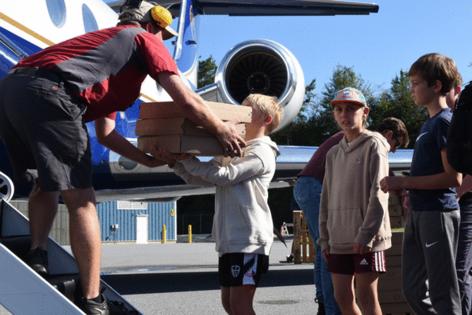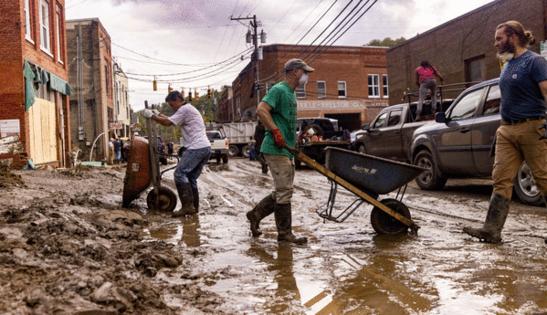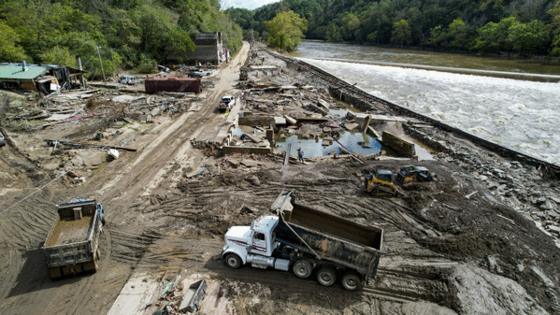Starlink reconnects Western NC reeling from Helene. Who gets credit becomes political
Published in News & Features
To reconnect emergency responders and residents after Hurricane Helene, the Federal Emergency Management Agency has shipped dozens of Starlink satellite systems to rural Western North Carolina.
On Monday, FEMA announced 40 Starlink systems were in the region to assist emergency communications, with plans to deploy one system to each county affected by the storm. Another 140 systems will be sent to aid “with communications infrastructure restoration,” the White House said in a Sept. 30 statement on relief efforts.
A subsidiary of Elon Musk’s SpaceX, Starlink has positioned more than 6,000 satellites in low-Earth orbit to beam broadband internet service to on-the-ground terminals. The first North Carolina households installed Starlink in 2021, and since then, the system has been used in the aftermaths of natural disasters and war worldwide where traditional internet infrastructure faltered. Ukraine fighters, for example, have relied on Starlink in their battle against Russia.
On Tuesday, North Carolina mountain counties reported Starlink enabled emergency responders to receive calls and residents to check in on family. In Ashe County, north of Boone, the emergency management department has established connection at more than a half-dozen fire stations. Residents are advised to turn on Wi-Fi calling on their phones to link to this satellite service.
Many areas across Western North Carolina, from Cherokee to Asheville to the Blue Ridge foothills, have struggled to find consistent internet and cellular connectivity since Friday, after the remnants of Hurricane Helene dumped feet of water and caused destructive flooding. As of Monday, close to 70% of the region’s cellphone towers and equipment were out of service, federal communications data showed, as cut fiber-optic cables prompted widespread blackouts, according to the nonprofit news outlet Asheville Watchdog.
Starlink service gets political
Outside the region, the deployment of Starlink to North Carolina became politicized after false claims spread that former President Donald Trump had arranged the deployment of Starlink systems to storm-affected areas after the current administration failed or refused to do the same.
Trump said Monday during a speech in Valdosta, Georgia, that he had spoken to Musk about delivering Starlink systems to storm-affected areas. Early the next morning, Musk, who has endorsed Trump’s reelection bid, announced his coordination with the Republican candidate. On the platform X, which Musk also owns, the SpaceX founder wrote “Earlier today, @realDonaldTrump alerted me to additional people who need Starlink Internet in North Carolina. We are sending them terminals right away.”
On Tuesday, North Carolina state Sen. Danny Britt, a Republican who represents the Sandhills counties of Robeson, Hoke and Scotland across the state from Western North Carolina, posted on X that he had asked Trump “for help restoring communications to Western NC, and he delivered.”
“Within hours, President Trump got Elon Musk on the phone and a commitment of as many Starlink devices as we need to help save North Carolinians.”
However, the White House says the Starlink systems were on their way before these conversations occurred. FEMA announced Starlink’s presence in North Carolina on Sept. 30, the same day Trump spoke in Valdosta.
On X, White House spokesperson Andrew Bates commented on the Starlink deployment chronology, responding to an article about Trump and Musk’s conversations by stating, “This is already happening.”
Trump’s daughter, Ivanka, visited Hickory on Wednesday to deliver 300 Starlink systems in a visit coordinated by Medic Corps, a group running relief operations out of the Hickory Regional Airport. Ivanka Trump took photos with pilots, airport staff and volunteers.
Some on social media claimed that President Joe Biden or the Federal Communications Commission previously revoked from Starlink more than $900 million in grant funds to expand high-speed internet access in rural North Carolina. That’s not accurate.
In fact, the FCC had reviewed the grant applications in a two-phase process. Starlink was one of 379 applicants — called “winning bidders” — that made it past the first phase.
But funds for the winning bidders were contingent on a second-phase, in-depth application. After Starlink filed that application, the FCC determined that it didn’t qualify for funding.
According to a letter from the FCC chairperson, the agency found that Starlink:
—Couldn’t provide internet at the required speed set by the FCC.
—Would have imposed “high start-up costs on rural consumers,” requiring subscribers to buy a $600 dish to access internet.
—Proposed using some funds to provide internet to places like parking lots and road medians, which are not underserved rural households like the program intended.
______
(Julia Coin of the Charlotte Observer contributed.)
______
©2024 McClatchy Washington Bureau. Visit at mcclatchydc.com. Distributed by Tribune Content Agency, LLC.












Comments